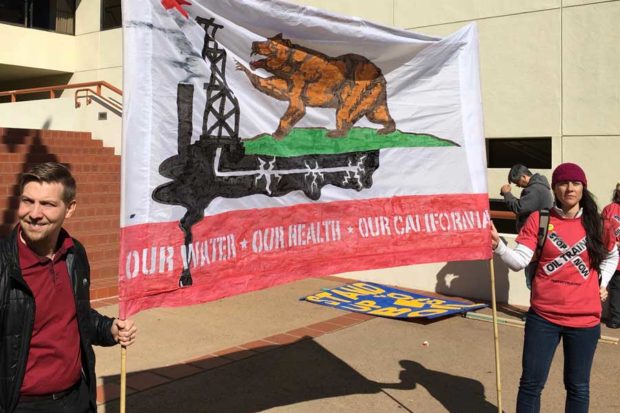
By Vic Bedoian
Faced with overwhelming opposition locally and around the California, in May, San Luis Obispo County Supervisors informally approved a controversial oil train terminal proposed for the Phillips 66 refinery at the coastal town of Nipomo. Just over a week later a massive train wreck in the Columbia River Gorge, replete with burning rail cars and spilled oil, is sure to raise the stakes in the continuing battle over the public health and environmental risks of oil trains.
The company seeks to bring in trainloads of oil from the Canadian tar sands and Bakken Crude from North Dakota. In doing so, the county went against the recommendation of its own planning commission staff to deny a conditional use permit because of the negative environmental consequences documented in an environmental review of the project. The board did not take a formal vote but ordered staff to come up with mitigations that will allow the project to go forward. The specter of mile-long oil trains, a history of derailments in other places, and the potential for future disasters, has prompted citizen groups and municipal governments around the state to lend their opposition to the project.
San Luis Obispo county supervisors ignored their planning commission staff, an Environmental Impact Report or E.I.R. that exposed numerous environmental hazards, and overwhelming opposition from the public both locally and statewide. At a planning commission meeting in February, apart from Phillips employees, resistance to oil trains was nearly unanimous from the hundreds of people who came to testify. Charles Varni of the Surfrider Foundation is a leader in the coalition to stop the oil trains, “Every star is aligned against this project both within our county, with pretty good empirical evidence, pretty solid EIR, you know science based, and then all of the communities along the rail line in California that have gone on record against this project.”
The board was evenly split with two supervisors strongly opposing the project, two equally strong in supporting Phillips 66, and supervisor Jim Irving casting the deciding vote. Varni is skeptical about the justification. “He basically is saying that because of the federal preemption around the operation of railroads, we neither have the power or authority to do anything about what’s going on the track, so I’m just going to look at this as a local land use issue and only focus on the three hundred acres at the Phillips refinery and that’s the project.”
Varni says the crowd was stunned by that reasoning, “Most of us immediately went – wait a minute – those things you want to put on there as conditions of the permit are exactly the things you were talking about earlier that you’re prevented from doing because of federal preemption.”
Federal preemption is at the heart of the issue. Railroad companies, oil companies and the federal government all claim that railway operations override state and local authorities. However, that principle is being challenged by state attorney general Kamala Harris, who claims railroads must still obey California’s environmental laws. Supervisors were warned by their attorney that the county might be held liable in case of an oil train accident anywhere along the rail line to the refinery. That’s why Charles Varni asserts that what happens in San Luis Obispo county has broad implications, “We are preparing ourselves to provide very detailed, well-researched, fact-based public comment on why this option is not a viable one for either the county or the state or the nation or the world.”
In September county staff brings back a revised proposal for supervisors to consider. Until then, critics will use the public comment time at board meetings to continue making their case, and trying to persuade the swing vote on the board to oppose the project. Whatever the decision, legal action will surely follow. Even then, the state Coastal Commission will take up the issue, and their staff is already on record opposing the project. The scenic Oregon town of Mosier, where sixteen cars – four in flames – have despoiled the water, the soil and the town’s wastewater system, the risk of a similarly volatile future should weigh heavily on decision-makers.
*****
Vic Bedoian is an independent radio and print journalist working on environmental justice and natural resources issues in the San Joaquin Valley. Contact him at vicbedoian @ gmail.com.
